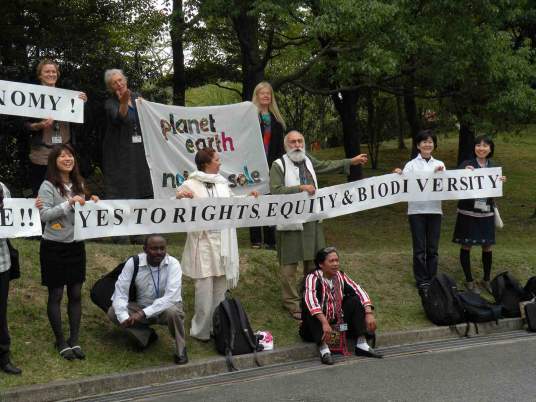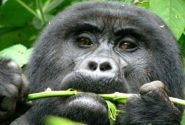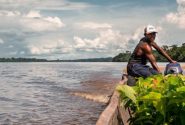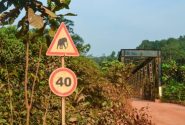By Stephen Leahy/IPS
NAGOYA, Japan, Oct 19, 2010 (Tierramérica) The accelerating destruction of natural habitats will take millions of years to recover from, scientists have warned.
This may be the last chance to apply the brakes, Achim Steiner, executive director of the U.N. Environment Programme, reminded delegates representing the 193 member countries of the U.N. Convention on Biological Diversity (CBD).
“This meeting is being held to address a very simple fact: we are destroying life on this Earth,” Steiner said at the opening plenary meeting Monday. “It is absolutely essential that nations work together here.”
Ryu Matsumoto, Japan’s environment minister, warned that the world was about to reach a threshold where the loss of biodiversity would become irreversible.
“We’re now close to a tipping point on biodiversity,” he said. “We may cross that in the next 10 years.”
With 16,000 participants, the Oct. 18-29 gathering is by far the biggest international meeting on biodiversity. The term biodiversity refers to the variety of plants, animals and other species that provide a wide range of services to humanity.
Insect pollinators, including bees, provide services worth an estimated $211 billion annually, representing close to 10 percent of the world’s agricultural output for human food. A new estimate puts the cost of the loss of biodiversity and ecosystems to the human race at $2 trillion to $5 trillion a year.
Despite the trillions of dollars of natural services at risk, countries failed to meet their 2010 target of substantially reversing the rate of loss of species. “Let us have the courage to look in the eyes of our children and admit that we have failed, individually and collectively,” said Ahmed Djoghlaf, executive secretary of the CBD.
“If we allow the current trends to continue we shall soon reach a tipping point with irreversible and irreparable damage to the capacity of the planet to continue sustaining life on Earth,” Djoghlaf told delegates.
“This is indeed a defining moment in the history of mankind,” he concluded.
Despite the high stakes and passionate words, there is no guarantee that countries will agree to a strong agreement to curb the loss of biodiversity by 2020.
Without a fair and equitable access and benefit-sharing protocol (ABS), there will be no agreement, said Gurdial Singh Nijar, the Malaysian delegate representing the Like- Minded Asia-Pacific group.
Many drugs, cosmetics and other valuable biochemicals used in the industrial world have been derived from plants and animals, very often from countries in the developing world. Everyone agrees countries and communities where these originated should be compensated. The devil is in the details, and those have been under negotiation for more than six years and remain contentious and complex.
“We cannot leave out derivative products including biochemicals,” Nijar said. In addition to the materials, the knowledge of the use of such plants and animals in many cases originates with indigenous people and that must be part of a new agreement.
“If you use traditional knowledge instead of looking for a needle in the haystack you get the needle put on a pin cushion,” said Christine von Weizsacker in reference to benefiting from indigenous peoples’ knowledge.
Thorny issues remain regarding how far down the deriviate chain ought to be compensated, patent issues, and figuring out a workable system for compliance including customs checkpoints, von Weizsacker, a spokesperson for the CBD Alliance, an umbrella of international non-governmental organisations, said in a press conference.
“Poor people need legal protections,” she said.
Without an ABS agreement, countries have shut down access to their genetic resources, says U.N. Environment Programme spokesperson Nick Nuttall. A fly that is decimating the Kenyan mango has a natural predator in Asia but researchers can’t obtain it until there is new protocol, he told IPS.
“This is the golden chance to get an ABS agreement,” Nuttall said.
But to reach agreement participants need to rise above the complex details and set basic ground rules. Afterwards adjustments or changes can be made as problems or issues arise, as has been done under other U.N. agreements.
“Are the risks so high that we can’t agree? We’re worse off without an agreement, in my view,” Nuttall said.
(*This story was originally published by Latin American newspapers that are part of the Tierramérica network. Tierramérica is a specialised news service produced by IPS with the backing of the United Nations Development Programme, United Nations Environment Programme and the World Bank.)
Stephen Leahy is a freelance journalist. He can be contacted at steve.leahy0@gmail.com. Or follow him on Twitter at http://twitter.com/StephenLeahy
We want you to share Forests News content, which is licensed under Creative Commons Attribution-NonCommercial-ShareAlike 4.0 International (CC BY-NC-SA 4.0). This means you are free to redistribute our material for non-commercial purposes. All we ask is that you give Forests News appropriate credit and link to the original Forests News content, indicate if changes were made, and distribute your contributions under the same Creative Commons license. You must notify Forests News if you repost, reprint or reuse our materials by contacting forestsnews@cifor-icraf.org.











